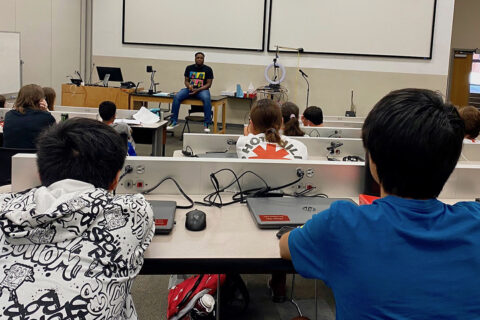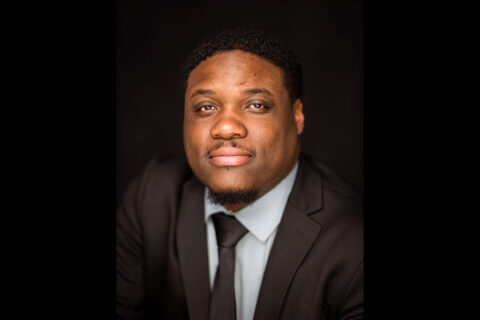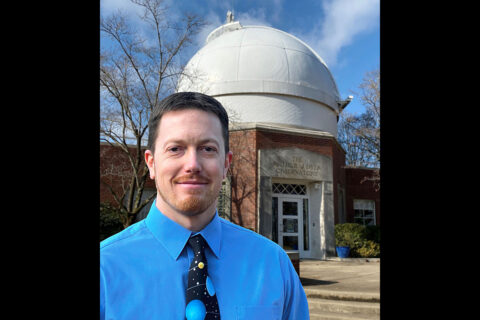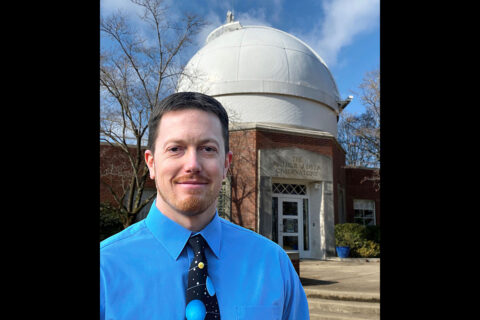 Clarksville, TN – During the first week of the Governor’s School for Computational Physics at Austin Peay State University (APSU), high school juniors and seniors got an opportunity to learn from two of the university’s high-achieving physics graduates.
Clarksville, TN – During the first week of the Governor’s School for Computational Physics at Austin Peay State University (APSU), high school juniors and seniors got an opportunity to learn from two of the university’s high-achieving physics graduates.

Austin Peay State University alumni Dr. Adrian Parker, chief engineer of the U.S. Navy’s Missile Energy Systems branch, and Dr. Billy Teets, director of Vanderbilt University’s Dyer Observatory, spoke to the students.
Parker, who graduated from APSU in 2007 before earning his doctorate at Tennessee State University in 2015, spoke to the group in person on Friday afternoon about the many lessons he has learned in his life, especially as he pursued advanced degrees and an engineering career.
Parker’s doctorate work focused on lithium-ion battery technology, an expertise that helped him advance to chief engineer of the Navy’s Missile Energy Systems branch, which handles about 70% of the missiles for the country.

“Now I got to know lithium thermal, silver zinc, fuel cells and supercapacitors, all this good stuff that had nothing to do with what I went to school for,” he told the students before leaning into his next point. “Learn as much as you possibly can, never stop learning as much as you possibly can because you’re going to need it.”
Teets, who graduated from Austin Peay in 2004 before earning a doctorate from Vanderbilt in 2012, spoke to the group of nearly 40 high-achieving high school juniors and seniors from across the state on Wednesday afternoon.
Via Zoom from the Dyer Observatory, he told them the story of Edward Emerson Barnard, perhaps Nashville’s most celebrated astronomer and commonly recognized as one of the most gifted observational astronomers ever.

“It’s a little bit more personal because I’m around the area that he grew up in, I’ve used the telescope that he actually used and made discoveries with, so it’s kind of like he’s one of the family down here,” Teets said. “He started from a meager childhood and became a world-renowned astronomer, even to this day.”
Barnard discovered more than a dozen comets in the 19th century, which propelled him to stardom, but he is best known for his discovery of Barnard’s Star, which is the fastest moving star in the sky. The star is sometimes called Barnard’s Runaway Star.
What is Governor’s School?
Governor’s School students live on campus for three weeks, enjoying a residential college experience while earning four college credit hours and an introduction to computational problems in physics and engineering.

Students normally make two field trips during Governor’s School – one to the National Space Science Technology Center in Huntsville, Alabama, and the other to the National Center for Computational Sciences at Oak Ridge National Laboratory.
The Tennessee Department of Education offers 11 programs to juniors and seniors across Tennessee.
Topics cover science, the arts, business, technology, humanities, international studies, and teaching.
The school runs through June 25th.
To learn more
- For more about the APSU Department of Physics, Engineering, and Astronomy, go to www.apsu.edu/physics/.
- For more about Governor’s Schools across the state, visit www.tn.gov/education/instruction/tdoe-governors-schools.html.


